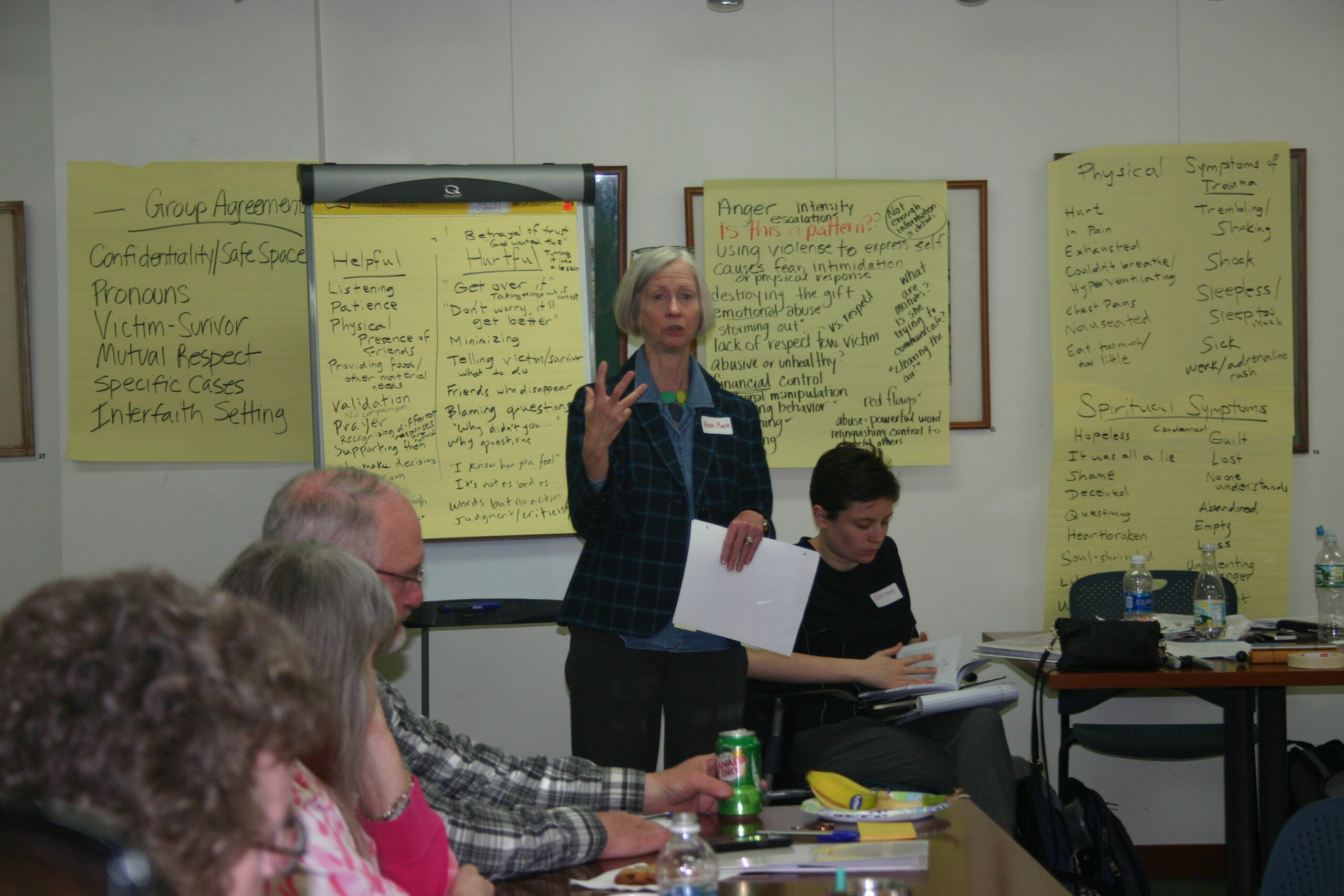
PRESQUE ISLE, Maine — Domestic abusers often use faith as a way to justify their abuse, according to experts in domestic violence services who conducted a workshop for religious leaders here on April 10.
“Many times abusers will say things to a victim like, ‘You’re my wife, so you have to obey me,’ or ‘God doesn’t believe in divorce,’” said Reverend Dr. Anne Marie Hunter, the executive director of Safe Havens Interfaith Partnership Against Domestic Violence, a Boston, Massachusetts-based organization. “They take concepts from the Bible and use them out of context to control the victim and make them feel powerless to leave the situation.”
Safe Havens works to bridge the gap between faith communities and domestic violence advocates and advise faith leaders and congregations on how to best support members who face an abusive relationship.

Alyson Morse Katzman, associate director of the Boston-based Safe Havens Interfaith Partnership Against Domestic Violence, speaks with religious leaders from around The County during a domestic violence workshop at the Mark and Emily Turner Memorial Library in Presque Isle on Tuesday, April 10.
(Staff Photo/Melissa Lizotte)
Hunter helped facilitate the daylong workshop that was made possible through a partnership between Safe Havens and the Maine Coalition to End Domestic Violence. Sponsored by the Hope and Justice Project, the event was held Tuesday at the Mark and Emily Turner Memorial Library in Presque Isle, where more than 30 faith leaders from around Aroostook County came gain greater knowledge about the issue and about the resources available to help domestic violence victims in their communities.
Hunter discussed with faith leaders how to recognize signs of domestic violence and possibly re-evaluate faith-based tools that might work in a typical family conflict but not when physical, emotional and/or sexual abuse is involved.
“I’ve worked for two battered women’s shelters in the past and I often saw that because clergy had few opportunities for trainings, they often reached for the tools they did have such as family and marriage counseling,” Hunter said. “During counseling a victim might feel safe enough to come forward, but on the way home their partner could abuse them and say, ‘I told you not to tell anyone.’ But if the victim stays silent during counseling and I just pat the couple on the back and send them home, it sends a message that I condone the abusive situation.”
Alyson Morse Katzman, associate director of Safe Havens, spoke about what she calls “the ugly language of domestic violence” and wanted faith leaders to understand that just because victims do not share all the details of what happened to them, that does not mean they haven’t experienced horrific trauma.
“It’s easy for people to dismiss a victim when they say, ‘Things aren’t so good at home right now,’ because they’ll often respond with, ‘Yeah, things weren’t so great at my house either last night,’” Katzman said. “But in these cases a victim is testing you to see how much they can confide in you. Unintentionally minimizing their situation only makes them more scared to reach out for help.”
When given the right tools, Safe Havens officials believe that faith leaders in Aroostook County can play vital roles in connecting victims with local resources such as the Hope and Justice Project, which provides legal advocacy, individual and group support, emergency shelters and a free 24-hour hotline. Many leaders who attended Tuesday’s workshop said that the lessons they learned about domestic violence are ones they can take with them to potentially help people in their congregations.
“I’ve seen the impact that domestic violence has on families,” said Greg Jackson, pastor of the United Baptist Church in Easton and facilitator of the Batterers Intervention Group, a court-mandated course for domestic abuse offenders in Caribou, Presque Isle and Houlton. “Coming here reinforces what I already know about the issue and how what I say and do for people in those situations can be helpful.”
Nancy Smith, also a facilitator for the Batterers Intervention Group, stated that hearing excerpts from real-life survivors’ stories during the workshop gave her hope that more stories of domestic violence can have happier endings.
“The most important thing I took away is that people can heal and move on from abusive relationships,” Smith said.
Following the workshop, Angel Murchison, a member of the Presque Isle Wesleyan Church and Full Gospel Assembly in Mars Hill, said she believes “the faith community will be better equipped to address these issues and bring hope back into people’s lives.”
Safe Havens will bring their training to faith leaders in Bangor and Portland in the coming weeks in an effort with the Maine Coalition to End Domestic Violence to create greater faith-based support systems for individuals dealing with domestic violence.
Since faith is an important part of many peoples’ lives in rural communities, Hunter told the group that religious leaders in Aroostook County can be huge assets to spreading awareness of domestic violence through their congregations.
“Faith is an invaluable source of strength and empowerment for those who experience domestic violence,” Hunter said. “Faith communities can play a tremendous role in creating social change and it’s fabulous that this many faith leaders in Aroostook County are leading those changes.”




